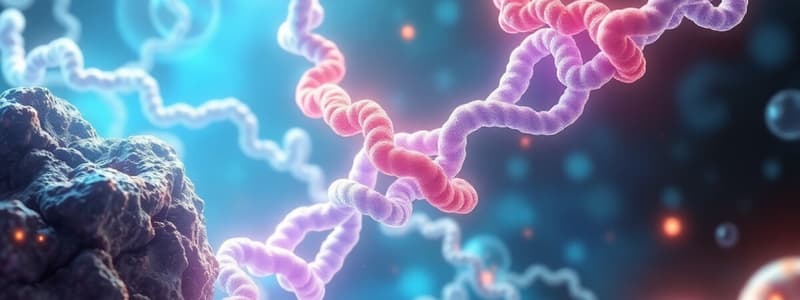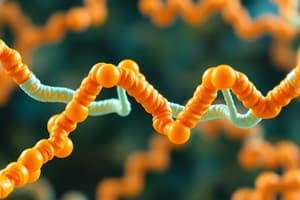Podcast
Questions and Answers
What percentage of nitrogen is found in proteins?
What percentage of nitrogen is found in proteins?
- 14%
- 16% (correct)
- 18%
- 12%
Which amino acids are highlighted for potential roles in protecting against neonatal allergies and infections?
Which amino acids are highlighted for potential roles in protecting against neonatal allergies and infections?
- Lysine and Arginine
- Tryptophan and Tyrosine
- Glutamine and Glutamate (correct)
- Cysteine and Methionine
What occurs during the second phase of protein digestion?
What occurs during the second phase of protein digestion?
- Digestion by pancreatic proteases (correct)
- Denaturation by stomach acid
- Formation of free amino acids
- Activation of pepsinogen
How does stomach acid affect protein during digestion?
How does stomach acid affect protein during digestion?
What is the process of converting pepsinogen to pepsin called?
What is the process of converting pepsinogen to pepsin called?
Which of the following statements correctly describes the body's amino acid pool?
Which of the following statements correctly describes the body's amino acid pool?
What is the purpose of gastric chief cells during protein digestion?
What is the purpose of gastric chief cells during protein digestion?
What term describes the large peptide fragments formed after pepsin cleavage?
What term describes the large peptide fragments formed after pepsin cleavage?
What does the rate of amino acid release from protein breakdown represent in the formula $B = Q-I$?
What does the rate of amino acid release from protein breakdown represent in the formula $B = Q-I$?
When dietary intake exceeds what is necessary to replete nighttime losses, what happens to the excess?
When dietary intake exceeds what is necessary to replete nighttime losses, what happens to the excess?
What is the impact of metabolic rate during disease on body protein?
What is the impact of metabolic rate during disease on body protein?
Which amino acid is specifically noted as a precursor for nitric oxide and plays a role in immunity?
Which amino acid is specifically noted as a precursor for nitric oxide and plays a role in immunity?
What is the purpose of adding insulin and growth hormone in the context of protein synthesis during illness?
What is the purpose of adding insulin and growth hormone in the context of protein synthesis during illness?
What is the primary role of CCK-PZ in the digestive process?
What is the primary role of CCK-PZ in the digestive process?
Which enzyme is activated by enteropeptidase in the digestive process?
Which enzyme is activated by enteropeptidase in the digestive process?
What is the source of the free amino acids present in the duodenum during digestion?
What is the source of the free amino acids present in the duodenum during digestion?
How does bicarbonate (HCO3-) contribute to digestion in the duodenum?
How does bicarbonate (HCO3-) contribute to digestion in the duodenum?
What process leads to the autocatalysis of trypsin?
What process leads to the autocatalysis of trypsin?
Which cells are primarily responsible for the secretion of bicarbonate into the duodenum?
Which cells are primarily responsible for the secretion of bicarbonate into the duodenum?
What role do brush border endopeptidases and aminopeptidases play in digestion?
What role do brush border endopeptidases and aminopeptidases play in digestion?
What is the significance of the pyloric sphincter in digestion?
What is the significance of the pyloric sphincter in digestion?
Which statement best describes the relationship between pancreatic proteases and trypsin?
Which statement best describes the relationship between pancreatic proteases and trypsin?
Why is it crucial for large peptide fragments to pass through the pyloric sphincter?
Why is it crucial for large peptide fragments to pass through the pyloric sphincter?
What is the role of enteropeptidase in the digestion process?
What is the role of enteropeptidase in the digestion process?
Which substance is primarily responsible for neutralizing acid in the duodenum?
Which substance is primarily responsible for neutralizing acid in the duodenum?
What is formed through the autocatalysis of trypsin?
What is formed through the autocatalysis of trypsin?
Which cells in the pancreas are primarily responsible for the secretion of proteases?
Which cells in the pancreas are primarily responsible for the secretion of proteases?
Which of the following proteases is NOT secreted in an inactive form?
Which of the following proteases is NOT secreted in an inactive form?
What is the primary action of CCK-PZ in the digestion process?
What is the primary action of CCK-PZ in the digestion process?
Which aminopeptidase is primarily active at the brush border?
Which aminopeptidase is primarily active at the brush border?
Which of the following is an example of a brush border enzyme?
Which of the following is an example of a brush border enzyme?
What is the effect of secretin in the digestive process?
What is the effect of secretin in the digestive process?
A deficiency in which of the following could impair protein digestion within the duodenum?
A deficiency in which of the following could impair protein digestion within the duodenum?
What is the primary mechanism of amino acid absorption in the intestinal lumen?
What is the primary mechanism of amino acid absorption in the intestinal lumen?
Which of the following statements about protein turnover is accurate?
Which of the following statements about protein turnover is accurate?
What role do dipeptidases and tripeptidases play in amino acid absorption?
What role do dipeptidases and tripeptidases play in amino acid absorption?
What is measured with N balance in studying protein turnover?
What is measured with N balance in studying protein turnover?
In amino acid kinetics, what does Q (Flux) represent at steady state?
In amino acid kinetics, what does Q (Flux) represent at steady state?
Which isotope can be used as a tracer in amino acid kinetics studies?
Which isotope can be used as a tracer in amino acid kinetics studies?
Why do structural proteins typically have a low rate of turnover?
Why do structural proteins typically have a low rate of turnover?
What is the role of Na+, K+-ATPase in amino acid absorption?
What is the role of Na+, K+-ATPase in amino acid absorption?
Which of the following is a characteristic of isotopically labeled tracers used in amino acid studies?
Which of the following is a characteristic of isotopically labeled tracers used in amino acid studies?
What primarily characterizes the absorption of dipeptides and tripeptides in the intestine?
What primarily characterizes the absorption of dipeptides and tripeptides in the intestine?
Flashcards are hidden until you start studying
Study Notes
Proteins: The Building Blocks of Life
- Proteins are essential macromolecules found in every living organism
- They comprise approximately 16% nitrogen by weight
- Human body protein is composed of 20 essential amino acids
- Proteins contribute to a wide array of bodily functions, including:
- Blood Stability
- Muscle Function
- Biochemical Reaction Centers
- Signaling (hormones and cytokines)
- Enzyme Activity
Amino Acids: The Monomers of Protein
- Essential amino acids: Must be obtained from the diet
- Non-essential amino acids: Can be synthesized by the body
- Conditional amino acids: Become essential under certain conditions (e.g., illness, stress)
Protein Synthesis: The Process of Creating Proteins
- Translation: The process by which genetic information encoded in DNA is used to create a protein molecule
- Ribosomes: Cellular organelles responsible for protein synthesis
- Messenger RNA (mRNA): Carries the genetic code from DNA to the ribosomes
Protein Digestion and Absorption
- Phase 1 (Gastric Digestion):
- Stomach acid denatures proteins
- Pepsinogen is activated into pepsin, which breaks down proteins into smaller peptides
- Phase 2 (Pancreatic Proteases):
- Pancreatic enzymes (trypsin, chymotrypsin, elastase, carboxypeptidases) further break down peptides in the duodenum
- Phase 3 (Brush Border Digestion):
- Final breakdown of peptides into individual amino acids by brush border enzymes
- Phase 4 (Absorption):
- Amino acids and di- and tri-peptides are absorbed into the intestinal epithelium
- Phase 5 (Transport):
- Absorbed amino acids are transported into the bloodstream
Amino Acid Metabolism: The Body's Utilization of Amino Acids
- Catabolism (Breakdown): Amino acids are broken down for energy production or converted into other molecules
- Anabolism (Synthesis): Amino acids are used to build proteins, hormones, and other essential compounds
- Transamination: The transfer of an amino group from one molecule to another
- Deamination: The removal of an amino group from an amino acid
Protein Turnover: The Dynamic Equilibrium of Protein Synthesis and Breakdown
- Protein turnover: The continuous process of protein degradation and synthesis
- High turnover rate: Proteins with regulated concentrations or signaling functions
- Low turnover rate: Structural proteins
- Nitrogen balance: A state of equilibrium where protein synthesis equals protein breakdown
Methods for Measuring Protein Turnover
- Nitrogen balance: Assessing the difference between nitrogen intake and nitrogen excretion
- Tracer methods: Using isotopically labeled tracers (radioactive or stable isotopes) to track amino acid kinetics
Amino Acid Requirements: Ensuring Adequate Intake
- Recommended Dietary Allowances (RDAs): Guidelines for protein intake based on age, sex, and activity level
- Classical N balance studies: Require several days for equilibration
- Indicator tracer methods: Allow for direct measurement of amino acid oxidation
Protein and AAs in Disease: Dietary Considerations in Illness and Injury
- Increased metabolic rate: Body protein is mobilized for energy and gluconeogenesis
- Essential amino acid supplementation: May be required to support protein synthesis and prevent catabolism
- Specific amino acid needs: Glutamine, arginine, and other conditionally essential amino acids may be crucial in certain disease states
Protein Controversies: Exploring the Impact of High Protein Intake and Other Considerations
- High protein intake and renal failure: Potential risks in individuals with pre-existing kidney disease
- High protein diets for weight loss: Effectiveness and potential drawbacks
- Protein intake and bone health: Potential effects of protein intake on bone density and health
Studying That Suits You
Use AI to generate personalized quizzes and flashcards to suit your learning preferences.




